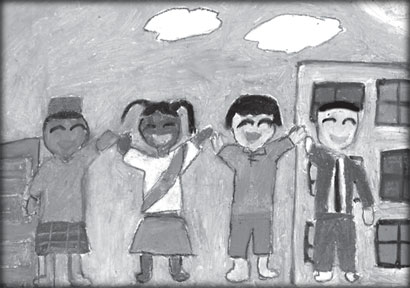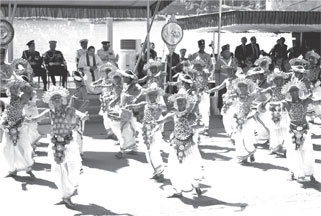Move forward together as one people
By Lionel Wijesiri
A friend asked me recently what my feelings about patriotism were.
She caught me off guard. It had been some time since I thought deeply
about my relationship to my country. Since our conversation, I’ve
continued to think about what it means to be a patriot and if I am one.
 |
|
A drawing by a
pre-school child on ethnic harmony |
Around the dinner table in the suburb of Colombo where I grew up, my
parents would point out at just the proper time in our social
discussions that patriotism means loving our country and also, working
hard to make it more lovable. The flag, they would add, could take care
of itself. This advice did not keep us from rushing down to Galle Face
Green to watch the annual Independence Day parade and gleefully wave
National Flags. Commemoration of the nation’s Independence Day was fun,
and it made us feel good.
One important event on our Independence Day celebrations, since those
days, was the display of the nation’s gratitude to the patriotic men and
women who valiantly fought and won a war for the reunification of our
territory. The historic importance of this achievement cannot be
underestimated. They sacrificed their youth, their limbs, and sometimes
their lives, because their country asked.
The two-minute silence was a solemn moment for me. There was
stillness in the air; all you could hear was the occasional clicking of
camera shutters, quite rightly recording the tribute for history. It was
incredibly hard to describe the shared emotion, but it was almost
tangible and could be read on every single person’s face, a steely
combination of patriotism and resolve.
It was a moment of truth when I experienced the real sense of
patriotism which goes hand in hand with the independence celebrations of
a country.
I often wonder whether it is different today. Has our younger
generation understood what patriotism really means?
Unity
Today, with the complete eradication of terror and after three
decades of strife, we have become sadder, but wiser. Sixty odd years
ago, if we could have understood the solemnity and the importance of the
concept of a unified nation, we could have prevented the bloodshed and
waste of human and national resources.
It is not too late, yet. Let us be honest to ourselves, listen to our
hearts, and seek the right answers for a few questions. If we can find
the right answers, we can look forward to become again a unified nation
in double-quick time. Let us start from our own experiences. We all know
that national identities and loyalties are threatened from within
(rather than from outside) and they are quite real.
This phenomenon is not exclusive to our nation. Throughout the world,
the possibility of “nations within states” and of internecine conflict
along religious, ethnic, and linguistic lines seem ever-present. The
former Yugoslavia is perhaps the most prominent illustration of state
disintegration amid clashes between ethnic and religious groups with
aspirations to nationhood. Yugoslavia even begat a label for this
process: balkanisation.
The cases of Southern Sudan, Chechnya and Iraq are three more recent
examples. Moreover, there have also been less famous but still
significant mobilisations along ethnic lines in other areas of the
world, such as Latin America. Even milder dynamics that likely do not
portend state disintegration are still interpreted as threatening
national identity.
Sixty-five years after Independence, I believe it’s time for us also
to begin investigating more systematically the variation in attachment
among the different segments of our population to the motherland. We
should focus in particular on how our populations that are “minority” in
terms of ethnicity, religion and language feel about their country. In
this investigation, we should seek to answer two questions. First, do
our minority populations feel less attachment to the country in which
they live? Second, what political, economic, and cultural factors
strengthen or weaken the national attachment of minority populations?
Living in a divided nation makes it harder to be a patriot. We have
to decide how to advocate for the country as a whole as opposed to
merely our own perspective. Commitment and criticism are steps one and
two of patriotism, but the third step - service - is more difficult:
Service by mouth and by action, by learning, educating and advocating.
This kind of service makes you the truest type of patriot, one willing
to work for change instead of only asking for it.
Patriotism
It is a well-known economic principle that for development to be
achieved by a society, the people have to be the driving force behind
it. All development undertakings must involve the people, who ought to
be seen in the initiation and implementation stages of development
projects. Fulfilment of these conditions do not in any way guarantee
development in the absence of unity and harmony among the people. This
is because no objective, however great the aspiration might be, is
attainable on the basis of individualism. Several people have to strive
together if even the simplest of things is to be achieved.
 |
|
Independence Day is celebrated in
grandeur every year |
It is, therefore, that I reiterate that on the 65th anniversary of
our independence we have to seriously ponder and contemplate on the
theme of ‘National Unity and Patriotism’. This theme is indeed apt and
highly relevant, because it requires every Sri Lankan, young and old, at
home and abroad, to take a deeper reflection of what it takes to achieve
our national vision and even surpass the development targets that we
have set for ourselves over the years.
Much of the social and economic progress have been achieved in the
past 65 years. The signs are already boldly written on every Sri Lankan
in the sense of the many opportunities that have been provided to enable
him/her to live in better and much improved conditions of living.
However, despite these achievements, we should all recognise the added
unrelenting effort that is needed to make our country Asia’s success
story when it comes to peace, development, progress and prosperity.
National pledge
President Mahinda Rajapaksa has often said that the advancement of
every Sri Lankan, regardless of affiliations in terms of politics,
religion or race, is his utmost priority. The assurance presents to the
nation’s citizens to take ownership of national development
undertakings, so that collectively, we can accomplish our common
aspirations. As we take stock to commemorate the 65th anniversary of our
freedom from foreign rule, we should at all times remember that where
there is unity, there will always be peace and tranquillity.
When unity is secured, all other development facilities will fall in
to place because everybody will continue to work towards the progress of
the society; this accelerates the overall development process. On the
other hand, when disunity is the order of the day, the resultant effect
is total negligence. It is, therefore, fundamental that, at least for
the sake of our future generations, we come together as one - as Sri
Lankans - in pursuit of our collective aspirations.
With everything that we do as Sri Lankans, we should always remember
our national pledge, which teaches us that we must stand together and
move forward as one people, for if we insist on pursuing our goals
without keeping the collective objective in mind, we shall be divided,
and divided we shall fall.
The country belongs to all of us and it is a collective
responsibility to deliver its development.
This is the lesson on patriotism. And, this must be our pledge for
this Independence Day and beyond.
|



